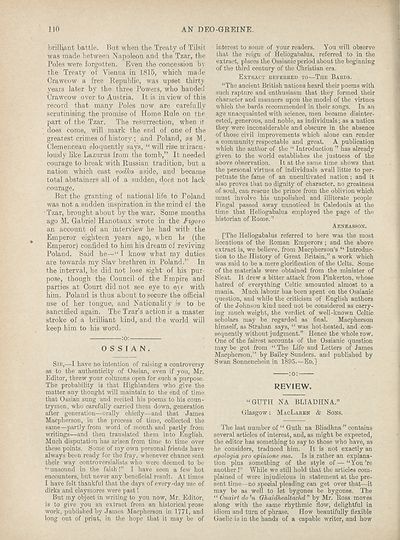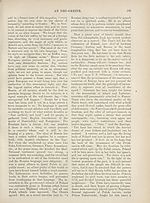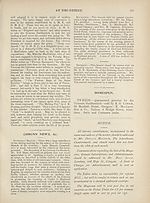An Comunn Gàidhealach Publications > Deo-gréine > Volume 10, October 1914-September 1915
(118) Page 110
Download files
Complete book:
Individual page:
Thumbnail gallery: Grid view | List view

110
AN DEO-GREINE.
brilliant battle. But when the Treaty of Tilsit
was made between Napoleon and the Tzar, the
Poles were forgotten. Even the concession by
the Treaty of Vienna in 1815, which made
Crawcow a free Republic, was upset thirty
years later by the three Powers, who handed
Crawcow over to Austria. It is in view of this
record that many Poles now are carefully
scrutinising the promise of Home Rule on tbe
part of the Tzar. The resurrection, when it
does come, will mark the end of one of the
greatest crimes of history ; and Poland, as IV!.
Clemenceau eloquently says, “ will rise miracu¬
lously like Lazurus from the tomb,” It needed
courage to break with Russian tradition, but a
nation which cast vodka aside, and became
total abstainers all of a sudden, does not lack
courage.
But the granting of national life to Poland
was not a sudden inspiration in the mind of the
Tzar, brought about by the war. Some months
ago M. Gabriel Hanotaux wrote in the Figaro
an account of an interview he had with the
Emperor eighteen years ago, when he (the
Emperor) confided to him his dream of reviving
Poland. Said he—“ I know what my duties
are towards my Slav brethren in Poland.In
the interval, he did not lose sight of his pur¬
pose, though the Council of the Empire and
parties at Court did not see eye to eye with
him. Poland is thus about to secure the official
use of her tongue, and Nationality is to be
sanctified again. The Tzar’s action is a master
stroke of a brilliant hind, and the world will
keep him to his word.
O S S I A N .
Sir,—I have no intention of raising a controversy
as to the authenticity of Ossian, even if you, Mr.
Editor, threw your columns open for such a purpose.
The probability is that Highlanders who give the
matter any thought will maintain to the end of time
that Ossian sung and recited his poems to his coun¬
trymen, who carefully carried them down, generation
after generation—orally chiefly—and that James
Macpherson, in the process of time, collected the
same—partly from word of mouth and partly from
writings—and then translated them into English.
Much disputation has arisen from time to time over
these points. Some of my own personal friends have
always been ready for the fray, whenever chance sent
their way controversialists who were deemed to be
‘•unsound in the faith!” I have seen a few hot
encounters, but never any beneficial result. At times
I have felt thankful that the days of every-day use of
dirks and claymores were past!
But my object in writing to you now, Mr. Editor,
is to give you an extract from an historical prose
work, published by James Macpherson in 1771, and
long out of print, in the hope that it may be of
interest to some of your readers. You will observe
that the reign of Heliogabalus, referred to in the
extract, places the Ossianic period about the beginning
of the third century of the Christian era.
Extract referred to—The Bards.
“The ancient British nations heard their poems with
such rapture and enthusiasm that they formed their
character and manners upon the model of the virtues
which the bards recommended in their songs. In an
age unacquainted with science, men became disinter¬
ested, generous, and noble, as individuals; as a nation
they were inconsiderable and obscure in the absence
of those civil improvements which alone can render
a community respectable and great. A publication
which the author of the “ Introduction ” has already
given to the world establishes the justness of the
above observation. It at the same time shows that
the personal virtues of individuals avail little to per¬
petuate the fame of an uncultivated nation; and it
also proves that no dignity of character, no greatness
of soul, can rescue the prince from the oblivion which
must involve his unpolished and illiterate people
Fingal passed away unnoticed in Caledonia at the
time that Heliogabalus employed the page of the
historian of Rome. ”
Aeneasson.
[fi’he Heliogabalus referred to here was the most
licentious of the Roman Emperors ; and the above
extract is, we believe, from Macpherson’s “ Introduc¬
tion to the History of Great Britain,” a work which
was said to be a mere glorification of the Celts. Some
of the materials were obtained from the minister of
Sleat. It drew a bitter attack from Pinkerton, whose
hatred of everything Celtic amounted almost to a
mania. Much labour has been spent on the Ossianic
question, and while the criticism of English authors
of the Johnson kind need not be considered as carry¬
ing much weight, the verdict of well-known Celtic
scholars may be regarded as final. Macpherson
himself, as Strahan says, “ was hot-heated, and con¬
sequently without judgment.” Hence the whole row.
One of the fairest accounts of the Ossianic question
maybe got from “The Life and Letters of James
Macpherson,” by Bailey Sunders, and published by
Swan Sonnenchein in 1895.—Ed.]
REVIEW.
“GUTH NA BLIADHNA.”
Glasgow: MacLaren & Sons.
The last number of “ Guth na Bliadhna ” contains
several articles of interest, and, as might be expected,
the editor has something to say to those who have, as
he considers, traduced him. It is not exactly an
apologia pro opinione sua. Is is rather an explana¬
tion plus something of the style of—“You’re
another !” While we still hold that the articles com¬
plained of were injudicious in statement at the pre¬
sent time—no special pleading can get over that—it
may be as well to let bygones be bygones. The
“ Cuairt do’n Ohaidhealtachd ” by Mr. Ross moves
along with the same rhythmic flow, delightful in
idiom and turn of phrase. How beautifully flexible
Gaelic is in the hands of a capable writer, and how
AN DEO-GREINE.
brilliant battle. But when the Treaty of Tilsit
was made between Napoleon and the Tzar, the
Poles were forgotten. Even the concession by
the Treaty of Vienna in 1815, which made
Crawcow a free Republic, was upset thirty
years later by the three Powers, who handed
Crawcow over to Austria. It is in view of this
record that many Poles now are carefully
scrutinising the promise of Home Rule on tbe
part of the Tzar. The resurrection, when it
does come, will mark the end of one of the
greatest crimes of history ; and Poland, as IV!.
Clemenceau eloquently says, “ will rise miracu¬
lously like Lazurus from the tomb,” It needed
courage to break with Russian tradition, but a
nation which cast vodka aside, and became
total abstainers all of a sudden, does not lack
courage.
But the granting of national life to Poland
was not a sudden inspiration in the mind of the
Tzar, brought about by the war. Some months
ago M. Gabriel Hanotaux wrote in the Figaro
an account of an interview he had with the
Emperor eighteen years ago, when he (the
Emperor) confided to him his dream of reviving
Poland. Said he—“ I know what my duties
are towards my Slav brethren in Poland.In
the interval, he did not lose sight of his pur¬
pose, though the Council of the Empire and
parties at Court did not see eye to eye with
him. Poland is thus about to secure the official
use of her tongue, and Nationality is to be
sanctified again. The Tzar’s action is a master
stroke of a brilliant hind, and the world will
keep him to his word.
O S S I A N .
Sir,—I have no intention of raising a controversy
as to the authenticity of Ossian, even if you, Mr.
Editor, threw your columns open for such a purpose.
The probability is that Highlanders who give the
matter any thought will maintain to the end of time
that Ossian sung and recited his poems to his coun¬
trymen, who carefully carried them down, generation
after generation—orally chiefly—and that James
Macpherson, in the process of time, collected the
same—partly from word of mouth and partly from
writings—and then translated them into English.
Much disputation has arisen from time to time over
these points. Some of my own personal friends have
always been ready for the fray, whenever chance sent
their way controversialists who were deemed to be
‘•unsound in the faith!” I have seen a few hot
encounters, but never any beneficial result. At times
I have felt thankful that the days of every-day use of
dirks and claymores were past!
But my object in writing to you now, Mr. Editor,
is to give you an extract from an historical prose
work, published by James Macpherson in 1771, and
long out of print, in the hope that it may be of
interest to some of your readers. You will observe
that the reign of Heliogabalus, referred to in the
extract, places the Ossianic period about the beginning
of the third century of the Christian era.
Extract referred to—The Bards.
“The ancient British nations heard their poems with
such rapture and enthusiasm that they formed their
character and manners upon the model of the virtues
which the bards recommended in their songs. In an
age unacquainted with science, men became disinter¬
ested, generous, and noble, as individuals; as a nation
they were inconsiderable and obscure in the absence
of those civil improvements which alone can render
a community respectable and great. A publication
which the author of the “ Introduction ” has already
given to the world establishes the justness of the
above observation. It at the same time shows that
the personal virtues of individuals avail little to per¬
petuate the fame of an uncultivated nation; and it
also proves that no dignity of character, no greatness
of soul, can rescue the prince from the oblivion which
must involve his unpolished and illiterate people
Fingal passed away unnoticed in Caledonia at the
time that Heliogabalus employed the page of the
historian of Rome. ”
Aeneasson.
[fi’he Heliogabalus referred to here was the most
licentious of the Roman Emperors ; and the above
extract is, we believe, from Macpherson’s “ Introduc¬
tion to the History of Great Britain,” a work which
was said to be a mere glorification of the Celts. Some
of the materials were obtained from the minister of
Sleat. It drew a bitter attack from Pinkerton, whose
hatred of everything Celtic amounted almost to a
mania. Much labour has been spent on the Ossianic
question, and while the criticism of English authors
of the Johnson kind need not be considered as carry¬
ing much weight, the verdict of well-known Celtic
scholars may be regarded as final. Macpherson
himself, as Strahan says, “ was hot-heated, and con¬
sequently without judgment.” Hence the whole row.
One of the fairest accounts of the Ossianic question
maybe got from “The Life and Letters of James
Macpherson,” by Bailey Sunders, and published by
Swan Sonnenchein in 1895.—Ed.]
REVIEW.
“GUTH NA BLIADHNA.”
Glasgow: MacLaren & Sons.
The last number of “ Guth na Bliadhna ” contains
several articles of interest, and, as might be expected,
the editor has something to say to those who have, as
he considers, traduced him. It is not exactly an
apologia pro opinione sua. Is is rather an explana¬
tion plus something of the style of—“You’re
another !” While we still hold that the articles com¬
plained of were injudicious in statement at the pre¬
sent time—no special pleading can get over that—it
may be as well to let bygones be bygones. The
“ Cuairt do’n Ohaidhealtachd ” by Mr. Ross moves
along with the same rhythmic flow, delightful in
idiom and turn of phrase. How beautifully flexible
Gaelic is in the hands of a capable writer, and how
Set display mode to:
![]() Universal Viewer |
Universal Viewer | ![]() Mirador |
Large image | Transcription
Mirador |
Large image | Transcription
| An Comunn Gàidhealach > An Comunn Gàidhealach Publications > Deo-gréine > Volume 10, October 1914-September 1915 > (118) Page 110 |
|---|
| Permanent URL | https://digital.nls.uk/125240880 |
|---|
| Description | Leabhar 10, Mìos Deireannach an Fhogharaidh 1914 gu Darna Mìos an Fhogharaidh 1915 |
|---|---|
| Attribution and copyright: |
|
| Description | This contains items published by An Comunn, which are not specifically Mòd-related. It includes journals, annual reports and corporate documents, policy statements, educational resources and published plays and literature. It is arranged alphabetically by title. |
|---|
| Description | A collection of over 400 items published by An Comunn Gàidhealach, the organisation which promotes Gaelic language and culture and organises the Royal National Mòd. Dating from 1891 up to the present day, the collection includes journals and newspapers, annual reports, educational materials, national Mòd programmes, published Mòd literature and music. |
|---|---|
| Additional NLS resources: |
|

